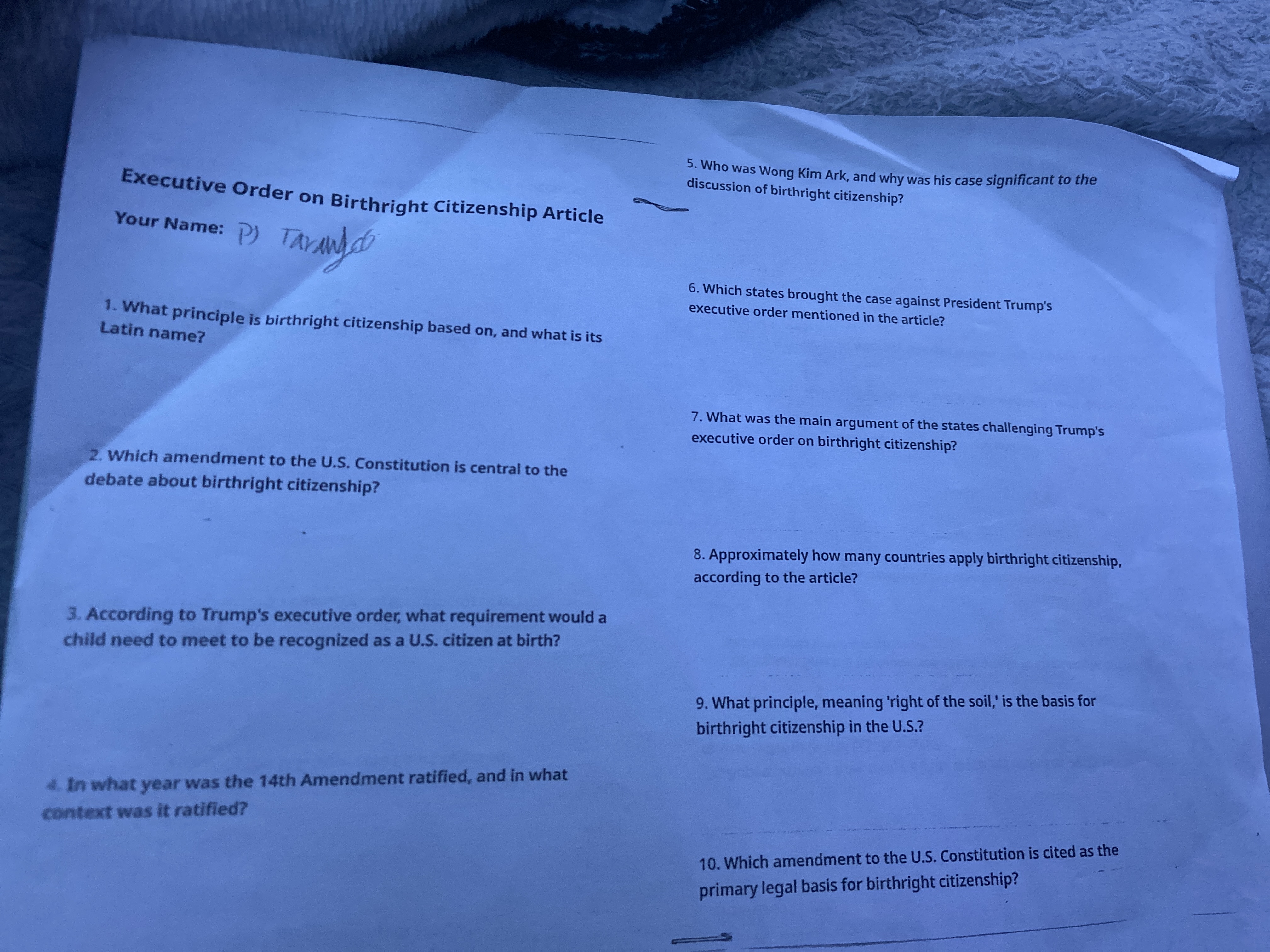What principle is birthright citizenship based on, and what is its Latin name? Which amendment to the U.S. Constitution is central to the debate about birthright citizenship? Accor... What principle is birthright citizenship based on, and what is its Latin name? Which amendment to the U.S. Constitution is central to the debate about birthright citizenship? According to Trump's executive order, what requirement would a child need to meet to be recognized as a U.S. citizen at birth? In what year was the 14th Amendment ratified, and in what context was it ratified? What was wrong with Kim Ark, and why was his case significant to the discussion of birthright citizenship? Which states brought the case against President Trump's executive order as mentioned in the article? What was the main argument of the states challenging Trump's executive order on birthright citizenship? Approximately how many countries apply birthright citizenship? What principle, meaning 'right of the soil,' is the basis for birthright citizenship in the U.S.? Which amendment to the U.S. Constitution is cited as the primary legal basis for birthright citizenship?

Understand the Problem
The question is asking about aspects of birthright citizenship in the U.S., specifically referencing an executive order by Trump and related constitutional amendments. It involves understanding historical and legal contexts regarding citizenship.
Answer
1. Jus soli 2. 14th Amendment 3. Parental citizenship 4. 1868, post-Civil War 5. Court confirmed birthright citizenship 6. 18 states 7. Violated the 14th Amendment 8. 30 countries 9. Jus soli 10. 14th Amendment.
- The principle is 'jus soli,' meaning 'right of the soil.' 2. The 14th Amendment. 3. There is no exact requirement mentioned, but generally it would involve parental citizenship status. 4. Ratified in 1868, post-Civil War era to protect rights of former slaves. 5. Wong Kim Ark was born in the U.S. to Chinese parents; his case affirmed the birthright citizenship principle. 6. At least 18 states challenged Trump's executive order. 7. States argued the executive order violated the 14th Amendment. 8. Around 30 countries apply birthright citizenship. 9. The principle is 'jus soli.' 10. The 14th Amendment.
Answer for screen readers
- The principle is 'jus soli,' meaning 'right of the soil.' 2. The 14th Amendment. 3. There is no exact requirement mentioned, but generally it would involve parental citizenship status. 4. Ratified in 1868, post-Civil War era to protect rights of former slaves. 5. Wong Kim Ark was born in the U.S. to Chinese parents; his case affirmed the birthright citizenship principle. 6. At least 18 states challenged Trump's executive order. 7. States argued the executive order violated the 14th Amendment. 8. Around 30 countries apply birthright citizenship. 9. The principle is 'jus soli.' 10. The 14th Amendment.
More Information
The case of Wong Kim Ark was crucial in establishing that birthright citizenship applies to children born in the U.S. regardless of their parents' nationality, reinforcing the 14th Amendment's Citizenship Clause.
Tips
Common mistakes include misunderstanding the scope of the 14th Amendment and its historical context.
Sources
- Birthright Citizenship - American Immigration Council - americanimmigrationcouncil.org
- The 14th Amendment and birthright citizenship, explained | Vox - vox.com
- Amdt14.S1.1.2 Citizenship Clause Doctrine - Constitution Annotated - constitution.congress.gov
AI-generated content may contain errors. Please verify critical information